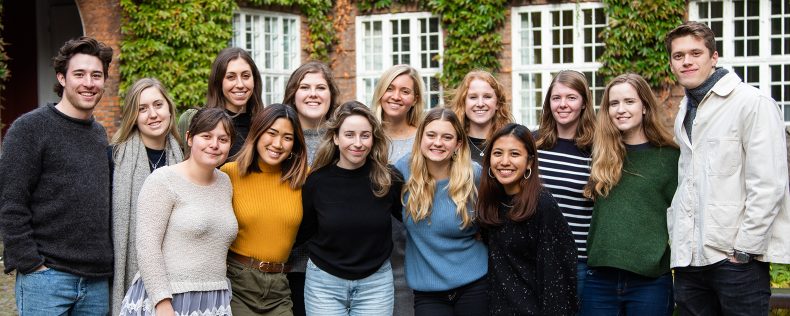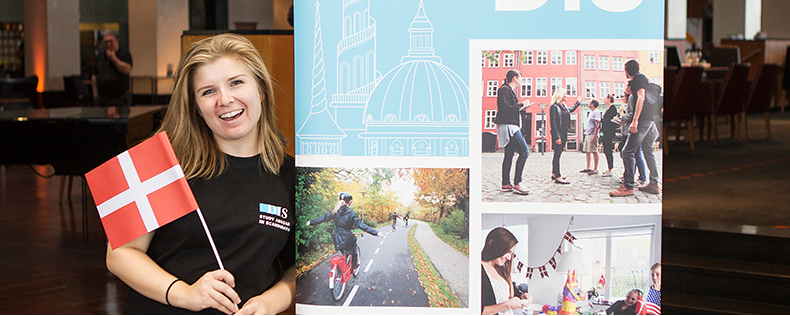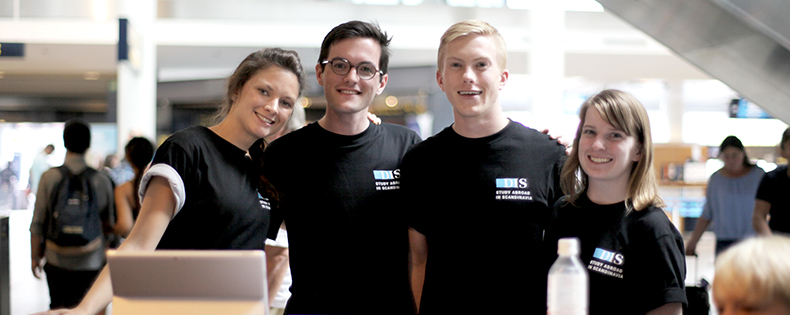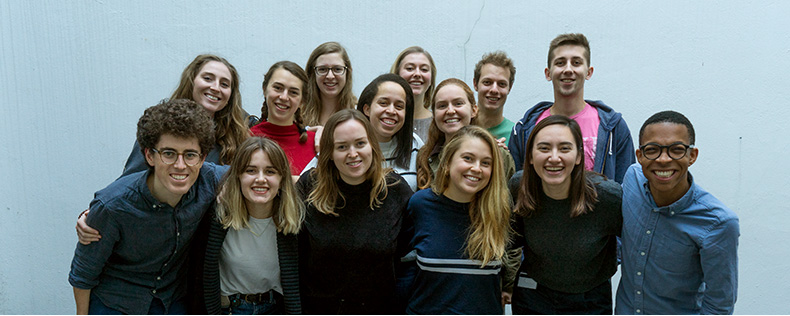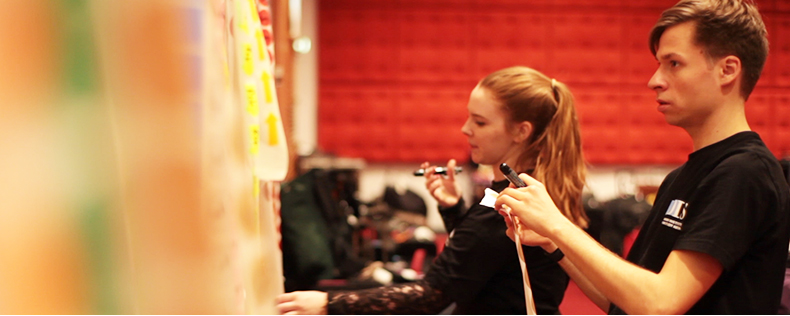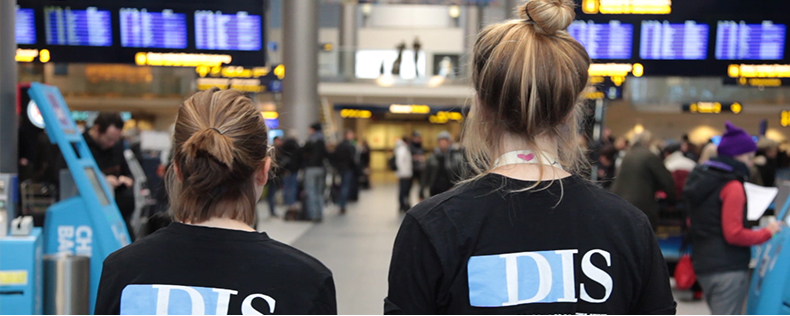The DIS internship program is an opportunity to not only enhance your professional skills, but also be part of a global non-profit organization that values innovation, creativity, and a shared commitment to making a positive impact on our students’ educational journeys.
View open internship positions here
Internship Objectives:
- Develop organizational, management, and administrative skills
- Enhance critical thinking and creative problem-solving abilities
- Gain hands-on experience in a dynamic international workplace
Internship Highlights
- Freedom and responsibility – Interns are given a high level of responsibility; expect to take ownership over your tasks and communicate frequently with your supervisor and team.
- Network opportunities – Build your network early in your career, skills-share with other interns, and learn from experts in the fields you are interested in.
- Unparalleled learning experience – Learning takes place both on the job and through an Intern Development Program, with training workshops that help you build interdisciplinary skills and learn from colleagues across departments
Ideal Candidate:
- DIS alum with a Bachelor’s degree or higher
- Passion for international education and cultural exchange
- Self-starter with professionalism and commitment to the DIS mission
- Eager to learn and grow personally and professionally
- Comfortable multitasking and meeting tight deadlines
- Team player willing to go above and beyond for colleagues
Responsibilities:
- Assist DIS staff, students, and faculty with daily operations and program development
- Contribute to an active learning environment with curiosity and enthusiasm
- Bring fresh ideas and energy to tasks
- Collaborate with committed colleagues focused on your development
Frequently Asked Questions
Q/ How is the DIS Internship Program different?
A/ While an American intern position is often short-term, unpaid, and part-time, a DIS internship lasts 13 to 15 months in Denmark (depending on the department) and 12 months in Sweden, offers a livable wage, and is full-time.
Most intern positions are administrative. As a DIS intern, you will have some of the usual “intern” tasks of making copies, filing, and arranging food and drinks for class events; however, you will also be responsible for much of the day-to-day operations of your office. This means you will likely have a higher degree of responsibility than in an American internship. Like any job, the workload can be exhausting and exhilarating at different times – but interns have reflected that their experience interning abroad gave them a unique skill set and perspective that made them valuable in the job market.
Q\ What are the working hours?
Normal business hours at DIS are approximately from 8:30 am – 5:00 pm. You can expect to spend the bulk of your working time during normal business hours, however, some tasks happen during the evenings. In Copenhagen, interns are hired to work 37 hours a week, excluding ½ hour for lunch. In Stockholm, interns are hired to work 40 hours a week, excluding 1 hour for lunch.
There is no overtime pay at DIS; instead, interns would receive approved absence time after a period that requires work outside of regular hours.
Q\ Do interns receive a stipend?
In Copenhagen, interns receive a monthly stipend of 20,050 DKK before taxes. In Denmark, taxes equate to approximately 38% of each month’s pay, meaning after-tax, interns have around 12,000 DKK/month.
In Stockholm, interns receive a monthly stipend of 29,550 SEK before taxes. In Sweden, taxes equate to approximately 30-32% of each month’s pay, meaning after tax, interns have around 20,100 SEK/month.
Note: If you are an American citizen, you are still required by U.S. law to file taxes in the U.S. You won’t owe any money on your income in Denmark or Sweden, but you still must file. You can get the necessary tax forms at the U.S. Embassy or download them online. More information can be found here. If you are not American, please consult your national government’s tax authority.
Q\ Will I need a local bank account?
You must have a local bank account, as all paychecks are given by direct deposit. In Copenhagen, many interns use Nordea. In Stockholm, many interns use Swedbank, Handelsbanken, Nordea, or SEB. The process of opening a bank account will require that you have a personal ID number; you will be guided through this process upon arrival.
Q\ What are housing & living expenses like?
Interns are responsible for finding their own housing. In Copenhagen, average rent for a furnished room is about 5,000-6000 DKK per month (typically including utilities). Most interns will rent a room with Danes.
In Stockholm, average rent for an apartment alone is about 10,000-15,000 SEK per month in central areas, and 8,000-9,000 SEK per month a bit further outside the city. With roommates, it is approximately 8,000 SEK per month in central areas and 5,000 SEK per month outside the city.
In both locations, DIS offers a discounted lunch that many of the employees take part in.
Q\ Do interns have health insurance?
In Copenhagen, the Danish national health coverage will cover your basic health insurance in Denmark. Information about the Danish national health insurance can be found here. In addition to the Danish national health insurance, DIS provides interns with additional comprehensive health, accident, and liability insurance during the internship. Personal travels outside of Denmark are included in the DIS insurance, and if you are required to travel for work (such as on Study Tours), DIS provides additional work travel insurance. Read more about the conditions of the insurance here.
In Stockholm, when you have obtained your unique Swedish personal ID, you are covered through the national health insurance. This provides the right to basic healthcare in Sweden. When seeing a doctor, you will pay a small fee for the consultation. Information about the Swedish national health insurance can be found here. In addition to the Swedish national health insurance, DIS provides interns with additional comprehensive health, accident, and liability insurance during the internship. Personal travels outside of Sweden are included in the DIS insurance, and if you are required to travel for work (such as on Study Tours), DIS provides additional work travel insurance. Read more about the conditions of the insurance here.
Note: neither the Danish/Swedish national health insurance nor the DIS health insurance cover medication, dental, optical, or treatments not given by a doctor or hospital (ex: mental health or physical therapy).
Q\ What about vacation?
Interns receive 27 days of paid vacation for a 13-month contract and 31 days of paid vacation for a 15-month contract.
Q\ Do interns go on Study Tours?
Interns have the opportunity to be Study Tour leaders; interns lead or co-lead at least one Study Tour assigned based on faculty interest in participation and the intern’s academic, social, and cultural leadership skills. There is no guarantee on specific destination or duration of the Study Tour.
Q\ Do interns take language classes?
It is encouraged, but not required, to take Danish/Swedish class. Interns usually take language classes from local language schools after work in the evening. This is also an excellent way to meet other expatriates in Denmark/Sweden.
Q\ What about cell phones?
Interns will generally use their current phones with a local carrier. In Copenhagen, popular phone carriers are Lebara, Telmore, CBB, OiSTER, Bibob, Telenor, and Telia. In Stockholm, popular phone carriers are Telia, Tele2, and Comvig.
Q\ How do I get a work and residence permit?
Once an internship offer is accepted, DIS will prepare the necessary documents to obtain a work and residence permit. After that, it is the intern’s responsibility to complete the forms and submit them as soon as possible. HR will assist interns throughout this process.
In Copenhagen, the current visa fee is DKK 4,175 (payable to the Danish Immigration Service in Copenhagen) + $30 (FVS Service fee) + $30, or $60, variable depending on where you live (to have your passport sent back to you with Federal Express). Biometrics must be obtained at a Danish Consulate or Embassy before you send the application to the Consulate in New York.
For Stockholm interns, please note that you are required to travel to Washington, D.C. to complete your visa application prior to your arrival. The current visa fee is SEK 2,000 (payable online through Migrationsverket’s website) + $235 (Swedish Consulate fee in Washington) + $20 (service fee).
Q\ Does DIS offer a visa and travel stipend to help me with some of the charges?
DIS will reimburse travel and visa expenses up to $1,200. Items that may be included in are:
- costs related to obtaining a visa
- paying the fees to the consulate
- international airfare to/from Copenhagen or Stockholm
- any travel expenses related to obtaining biometrics at a consulate before submitting the visa application
This travel stipend will likely not cover all expenses, but will provide some substantial help. You are expected to finance the remaining costs yourself. Interns will be reimbursed once the internship has begun (you will submit receipts).
Please note that Danish and Swedish visa rules are often subject to changes. However, DIS will be fully updated on any new regulations and requirements by the time a candidate is offered a position. Note that you need to have a passport that is valid until 6 months after your internship ends.
Q\ When my internship is complete, can I travel around Europe for a while before traveling back to the U.S.?
It is important to note that you must leave Denmark or Sweden no later than the last day of your visa. However, you can stay in Europe for 90 days after your visa ends (on visa-free tourist conditions). You may even come back to Denmark or Sweden again but remember that you are not allowed to work!
These are the current rules, but the regulations are constantly changing so make sure you double-check before you make any plans. It is your responsibility to be updated on the rules to avoid an overstay on your visa.
